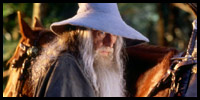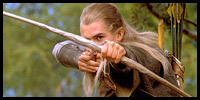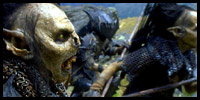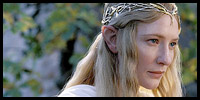
 |
|
The Lord of the Rings: The Fellowship of the Ring (2001)  Directed by Peter Jackson Cast: Elijah Wood, Ian McKellan, Viggo Mortensen, Sean Astin, Billy Boyd, Dominic Monaghan, Sean Bean, Ian Holm, Orlando Bloom, Liv Tyler, Cate Blanchett, John Rhys-Davies, Christopher Lee, Hugo Weaving. 2001 – 178 minutes Rated: Reviewed by Dustin Putman, December 20, 2001.  J.R.R. Tolkien's "The Lord of the Rings" trilogy is one of, if not the, most beloved and influential fantasy book series' ever written. In adapting them to the screen, director Peter Jackson (1996's "The Frighteners") was granted the sum of just under $300-million by New Line Cinema to film "The Fellowship of the Rings," "The Two Towers," and "The Return of the King" back-to-back-to-back, and release them each successive Christmas for three years.
J.R.R. Tolkien's "The Lord of the Rings" trilogy is one of, if not the, most beloved and influential fantasy book series' ever written. In adapting them to the screen, director Peter Jackson (1996's "The Frighteners") was granted the sum of just under $300-million by New Line Cinema to film "The Fellowship of the Rings," "The Two Towers," and "The Return of the King" back-to-back-to-back, and release them each successive Christmas for three years.
If the first installment, "The Fellowship of the Ring," is any indication of the quality and effort put into the next two films, then the general filmgoing public is in for a groundbreaking fantasy series that may both reinvigorate the genre and put the original "Star Wars" trilogy to shame. As a stand-alone movie, "The Fellowship of the Ring" is a very good motion picture (if not the brilliant one that many are touting it as) but, nonetheless, filled with imagination, energy, and awesome technical artistry. Something tells me, however, that the whole of the trilogy will likely equal up to much more than this first-third does when placed by itself.  For the uninitiated, "The Fellowship of the Ring" begins with a fast-paced, informative prologue that tells of the One Ring, which has the power to turn the wearer invisible. Forged by the Dark Lord, Sauron, it also has the ability to corrupt the person who possesses it. If Sauron or his henchmen were to ever get hold of it, nothing could stop them from ruling the world.
For the uninitiated, "The Fellowship of the Ring" begins with a fast-paced, informative prologue that tells of the One Ring, which has the power to turn the wearer invisible. Forged by the Dark Lord, Sauron, it also has the ability to corrupt the person who possesses it. If Sauron or his henchmen were to ever get hold of it, nothing could stop them from ruling the world.
Switch to the peaceful countryside of the Shire, hobbit Bilbo Baggins (Ian Holm), currently the holder of the Ring, is gearing up for his 111th birthday celebration when he is paid a visit from old friend Gandalf (Ian McKellen), a kindly wizard. Gandalf informs Bilbo that it is time for him to pass the Ring on to someone else, as the late Sauron's phantom servant, the Ring Wraiths, have begun scouring Middle Earth in search of it.  The responsibility of the Ring ends up falling upon young Frodo (Elijah Wood), Bilbo's heir. Accompanied by best friend Sam (Sean Astin), his cousins Merry (Dominic Monaghan) and Pippin (Billy Boyd), and later, humans Aragorn (Viggo Mortensen) and Boromir (Sean Bean), elf Legolas (Orlando Bloom), and dwarf Gimli (John Rhys-Davies), Frodo must make the long, perilous journey to Mordor, where he will drop the Ring into the fiery pits of Mount Doom--the only place able to destroy it once and for all.
The responsibility of the Ring ends up falling upon young Frodo (Elijah Wood), Bilbo's heir. Accompanied by best friend Sam (Sean Astin), his cousins Merry (Dominic Monaghan) and Pippin (Billy Boyd), and later, humans Aragorn (Viggo Mortensen) and Boromir (Sean Bean), elf Legolas (Orlando Bloom), and dwarf Gimli (John Rhys-Davies), Frodo must make the long, perilous journey to Mordor, where he will drop the Ring into the fiery pits of Mount Doom--the only place able to destroy it once and for all.
"The Lord of the Rings: The Fellowship of the Rings" is a mesmerizing technical triumph that, on behalf of the epic scale of the project, has never been matched. Glorious special effects, awesome landscapes (filmed in New Zealand), and marvelous cinematography (by Andrew Lesnie) are all on hand to create a whole new world unglimpsed on film before.  The multiple villains are also showstoppers, from the faceless, hooded Ring Wraiths, to the monstrous, zombiefied Orcs, to Saruman (Christopher Lee), Sauron's maniacal successor. Unlike the creatures in "Harry Potter and the Sorcerer's Stone," the villains here are not only made believable and genuinely life-threatening, but also quite frightening. The calamitous power that the Ring holds is also palpably felt throughout.
The multiple villains are also showstoppers, from the faceless, hooded Ring Wraiths, to the monstrous, zombiefied Orcs, to Saruman (Christopher Lee), Sauron's maniacal successor. Unlike the creatures in "Harry Potter and the Sorcerer's Stone," the villains here are not only made believable and genuinely life-threatening, but also quite frightening. The calamitous power that the Ring holds is also palpably felt throughout.
The actors take their roles very seriously, and acquit the characters with enough emotion and realism to make them truly involving. Elijah Wood (1998's "The Faculty") is the perfect choice to play the scared, but strong-willed, Frodo. He is the kind of easily relatable protagonist that you want to root for, and do. As his sidekick, Sam, Sean Astin (1993's "Rudy") makes a strong return to acting after a few years away from the limelight. And as Saruman, Christopher Lee (1999's "Sleepy Hollow") relishes his evil role, and makes for one of the more memorable human villains to come around in some time.  Who walks away with the picture entirely is Ian McKellen (2000's "X-Men"), who injects Gandalf with such indomitable spirit and feeling that it turns out to be one of the best performances of the year. McKellen hasn't been this good since 1998's "Gods and Monsters," and his pure thespian talents of disappearing into Gandalf deserve major kudos.
Who walks away with the picture entirely is Ian McKellen (2000's "X-Men"), who injects Gandalf with such indomitable spirit and feeling that it turns out to be one of the best performances of the year. McKellen hasn't been this good since 1998's "Gods and Monsters," and his pure thespian talents of disappearing into Gandalf deserve major kudos.
The two female characters are notably weaker, and not given much screen time. Liv Tyler (2001's "One Night at McCool's"), as angelic elf Arwen, is arresting for the ten minutes of screen time she has, but her role is superfluous to the main action. Arwen will allegedly take a larger part in the second film, "The Two Towers," and deservedly so, because Tyler is wasted. The always-wonderful Cate Blanchett (2001's "Bandits") plays elf queen Galadriel as a spiritual figure with grace and dignity but, again, is only appointed about ten minutes to strut her stuff.  With equal measures of action set pieces and exposition vital to the development of the story, "The Fellowship of the Ring" flows well. At three hours in length, the film is painless to sit through, with its energy only flagging in the final twenty minutes, which run a little long. Certain plot threads are also brought up but left open-ended, leaving them unsatisfying in relation to this overall film. Such a criticism may not hold much weight, though, once the second and third parts are released and all of the elements fall into a coherent whole.
With equal measures of action set pieces and exposition vital to the development of the story, "The Fellowship of the Ring" flows well. At three hours in length, the film is painless to sit through, with its energy only flagging in the final twenty minutes, which run a little long. Certain plot threads are also brought up but left open-ended, leaving them unsatisfying in relation to this overall film. Such a criticism may not hold much weight, though, once the second and third parts are released and all of the elements fall into a coherent whole.
It is easy to see how, in the wrong hands, "The Lord of the Rings: The Fellowship of the Ring" could have become another "Dungeons & Dragons." Fantasy is a tricky genre to work within, because the premises rely so much on otherworldly plausibility that they often come off feeling tacky. Director Peter Jackson and co-screenwriters Fran Walsh and Philippa Boyens have put so much dedication and care into this monumental undertaking that they rightfully deserve praise. Nothing appears overly cheesy, and there is nary a '70s hairstyle in sight (a 'la "Star Wars")--a definite plus. Is "The Fellowship of the Ring" one of the greatest motion pictures of all time, like some audiences and critics are prematurely labeling it as? Well, no; in fact, it isn't even one of the top ten of this year. But it is a wholeheartedly innovative, heartfelt, entertaining feast for the eyes. Now bring on "The Lord of the Rings: The Two Towers," already! ©2001 by Dustin Putman |
 |













